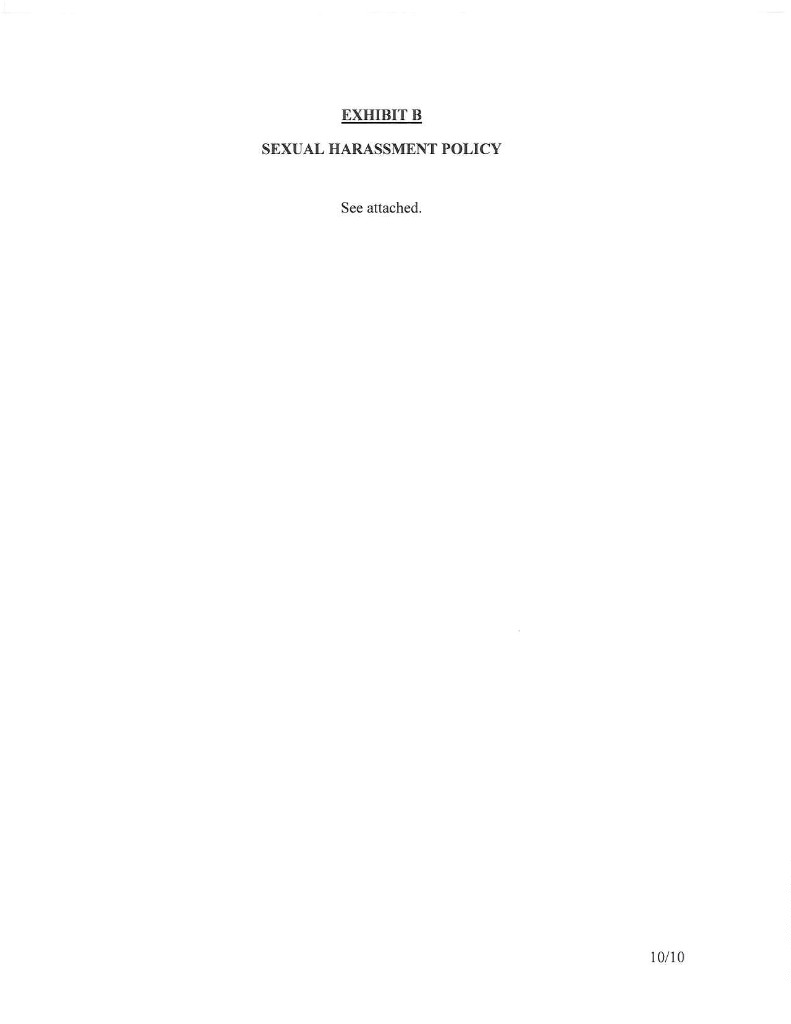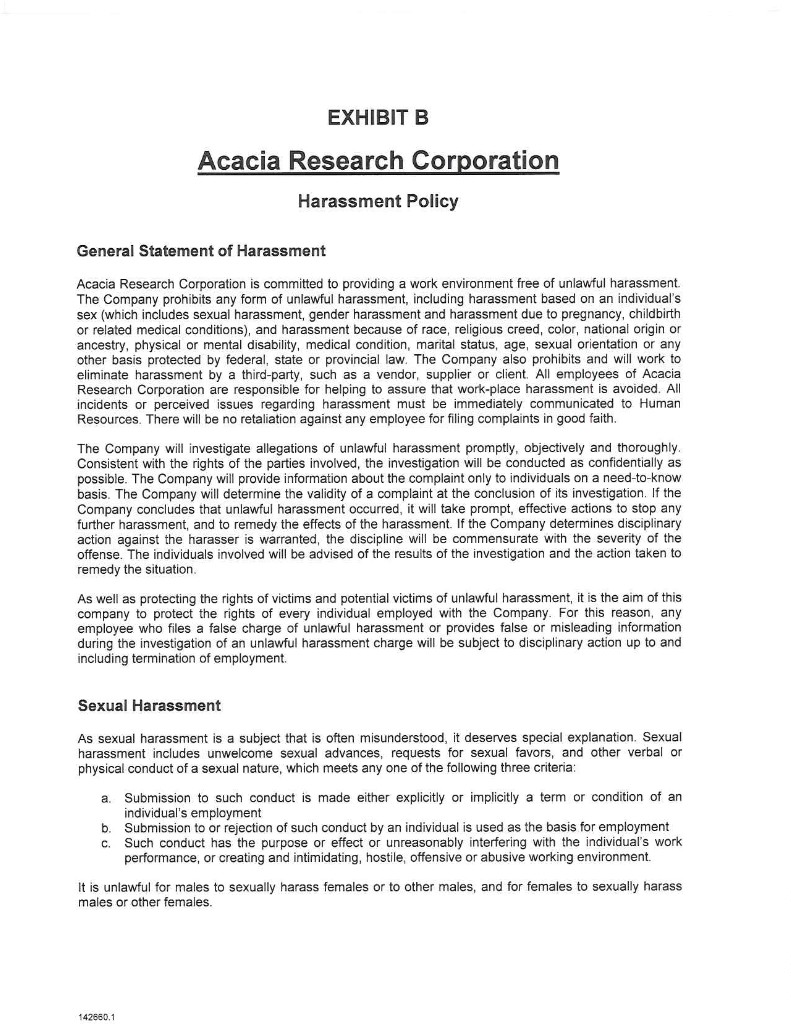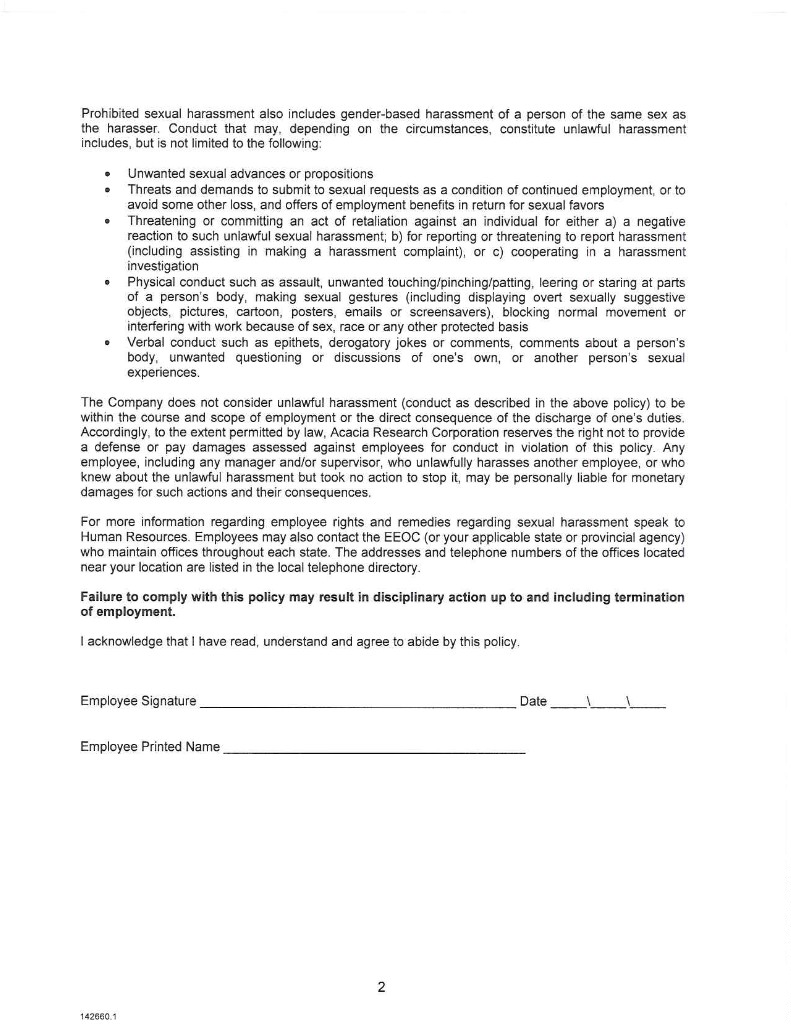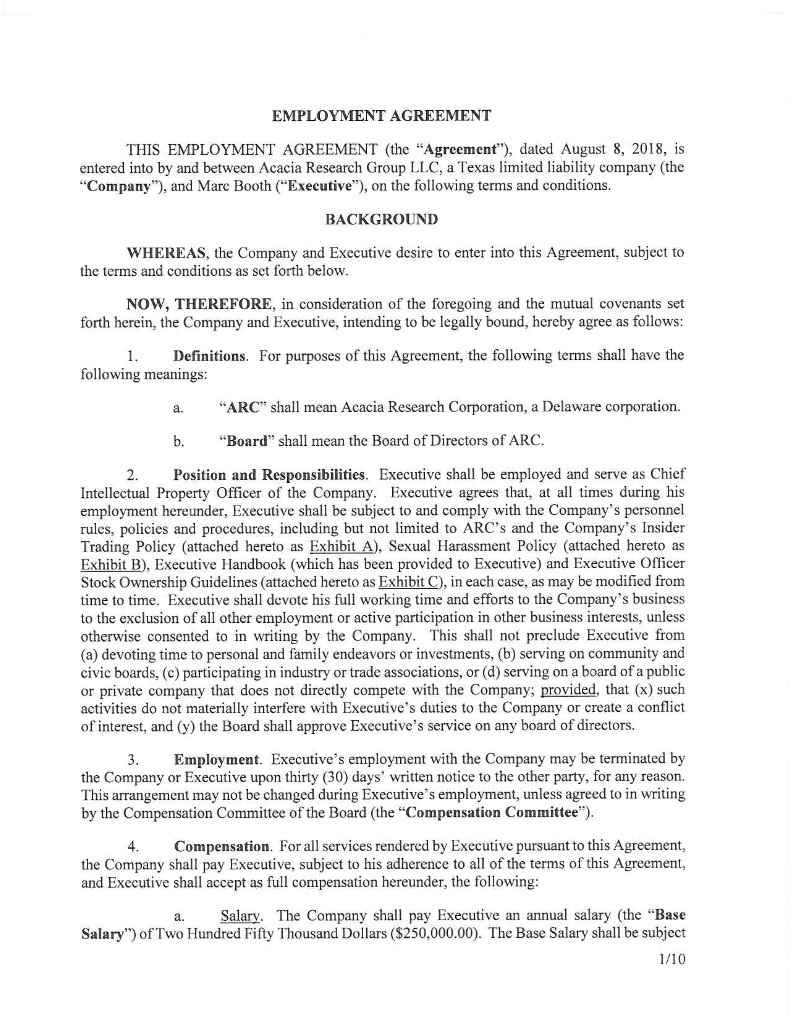

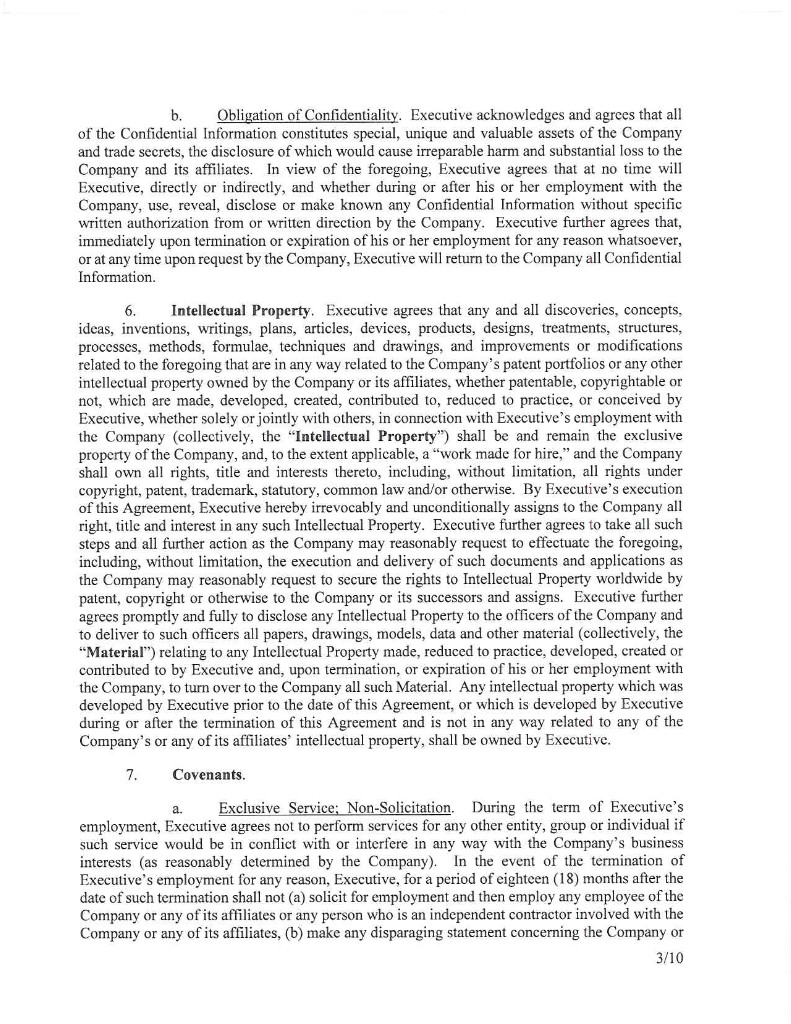
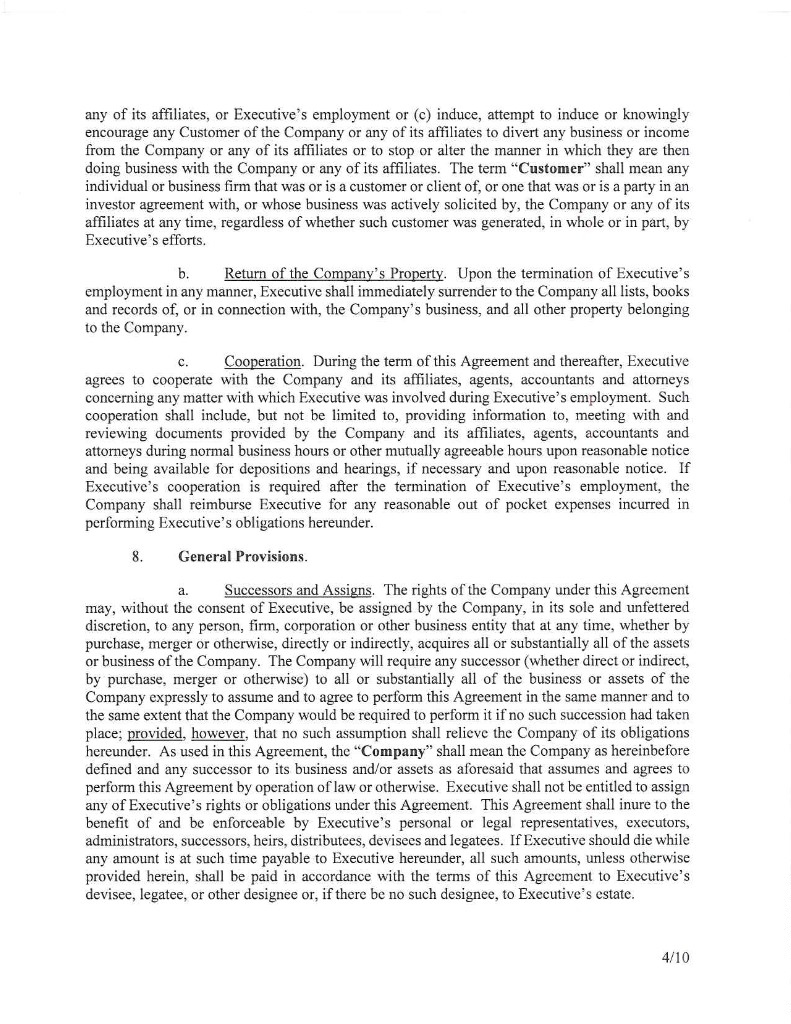
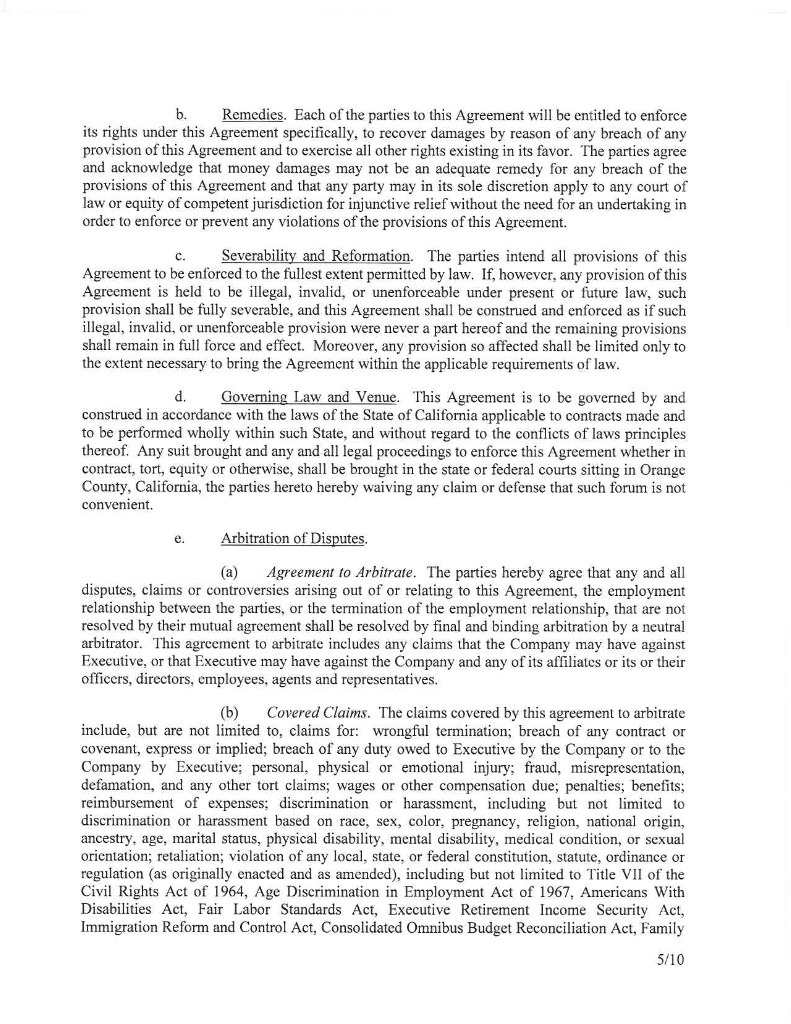



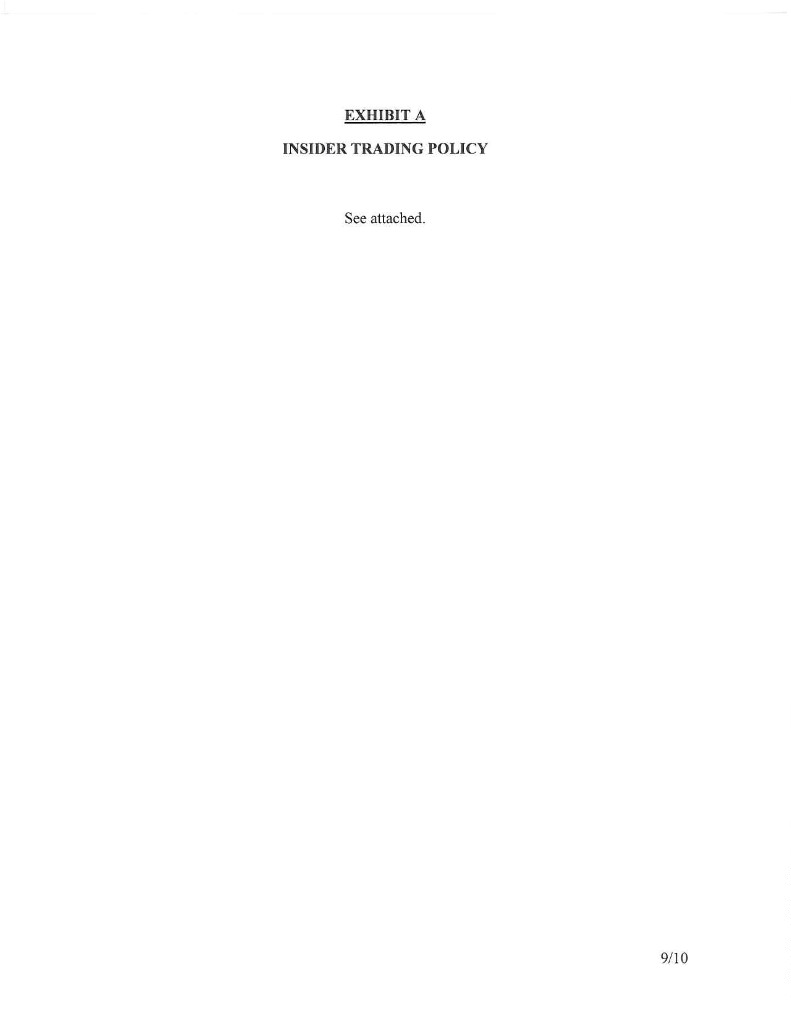
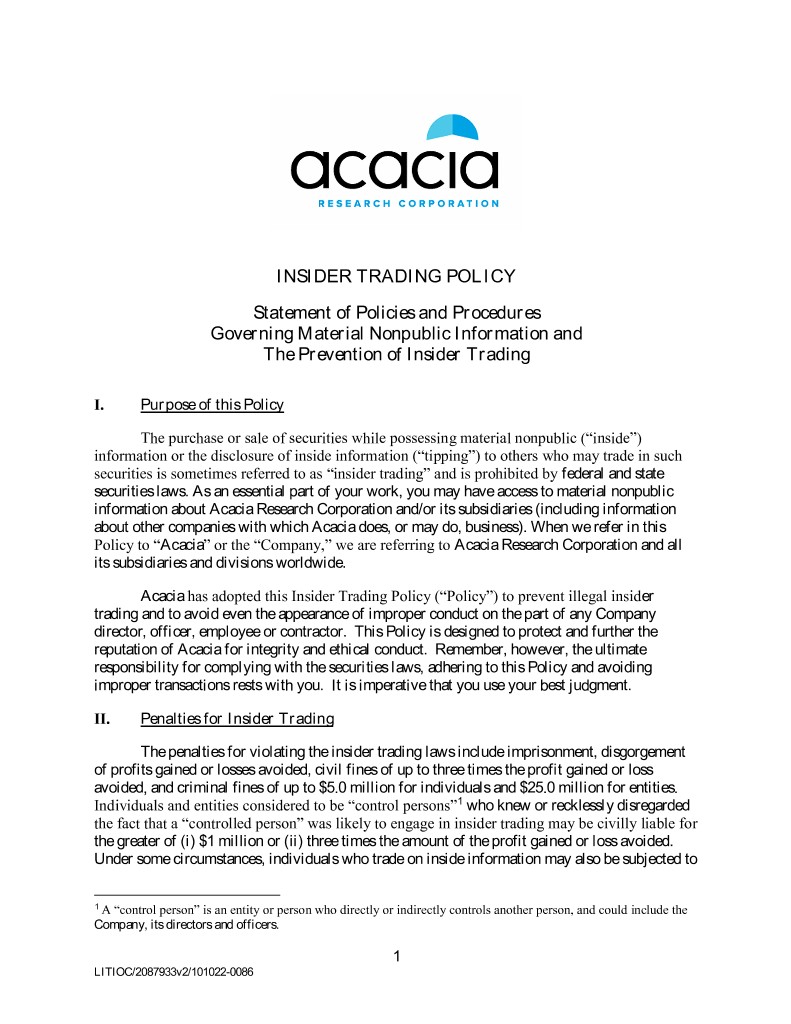
INSIDER TRADING POLICY Statement of Policies and Procedures Governing Material Nonpublic Information and The Prevention of Insider Trading I. Purpose of this Policy The purchase or sale of securities while possessing material nonpublic (“inside”) information or the disclosure of inside information (“tipping”) to others who may trade in such securities is sometimes referred to as “insider trading” and is prohibited by federal and state securities laws. As an essential part of your work, you may have access to material nonpublic information about Acacia Research Corporation and/or its subsidiaries (including information about other companies with which Acacia does, or may do, business). When we refer in this Policy to “Acacia” or the “Company,” we are referring to Acacia Research Corporation and all its subsidiaries and divisions worldwide. Acacia has adopted this Insider Trading Policy (“Policy”) to prevent illegal insider trading and to avoid even the appearance of improper conduct on the part of any Company director, officer, employee or contractor. This Policy is designed to protect and further the reputation of Acacia for integrity and ethical conduct. Remember, however, the ultimate responsibility for complying with the securities laws, adhering to this Policy and avoiding improper transactions rests with you. It is imperative that you use your best judgment. II. Penalties for Insider Trading The penalties for violating the insider trading laws include imprisonment, disgorgement of profits gained or losses avoided, civil fines of up to three times the profit gained or loss avoided, and criminal fines of up to $5.0 million for individuals and $25.0 million for entities. Individuals and entities considered to be “control persons”1 who knew or recklessly disregarded the fact that a “controlled person” was likely to engage in insider trading may be civilly liable for the greater of (i) $1 million or (ii) three times the amount of the profit gained or loss avoided. Under some circumstances, individuals who trade on inside information may also be subjected to 1 A “control person” is an entity or person who directly or indirectly controls another person, and could include the Company, its directors and officers. 1 LITIOC/2087933v2/101022-0086

private civil lawsuits. Moreover, as the material nonpublic information of Acacia is the property of the Company, trading on or tipping Acacia’s confidential information could result in serious employment sanctions, including dismissal. You should be aware that stock market surveillance techniques are becoming more sophisticated all the time, and the chance that federal authorities will detect and prosecute even a small insider trading violation is a significant one. III. Scope and Applicability A. Covered Persons. This Policy applies to Acacia’s Board of Directors and to all employees and contractors within all of Acacia’s operations worldwide. All persons covered by this Policy are referred to as “Covered Persons.” This Policy also applies to family members and domestic partners who share a Covered Person’s household. B. Covered Securities and Transactions. This Policy applies to all transactions in the Company’s equity securities, including common stock and any other type of securities that the Company may issue, such as convertible debentures and warrants, and exchange-traded options (including puts and calls) and other derivative securities. This Policy applies to sales, purchases, gifts, exchanges, pledges, options, hedges, puts, calls and short sales. This Policy applies to all investment decisions you make regarding Company securities. For example, if you have the power to direct the purchase or sale of Company securities by virtue of your position as a director or officer of a corporation or non-profit organization, or as a trustee of a trust or executor of an estate, then all transactions in Company securities on behalf of the corporation, organization, trust or estate are covered by this Policy. This Policy also applies to trading in securities of another company if you learn material nonpublic information about that company in the course of your employment or association with Acacia. C. Delivery of the Policy; Certifications. This policy will be delivered to all Covered Persons upon its adoption by the Company, and to all new directors, employees and where appropriate, contractors, at the commencement of their employment or service with the Company. Thereafter, the Policy shall be distributed annually. All Covered Persons must certify their understanding of, and intent to comply with, this Policy and send the original to the Company’s Human Resources Department. A copy of the certification that all Covered Persons must sign is attached hereto as Exhibit A. IV. Definitions A. Insider Trading. In general, “insider trading” occurs when a person purchases or sells a security while in possession of inside information in breach of a duty of trust or confidence owed directly or indirectly to the issuer of the security, the issuer’s stockholders or the source of the information. “Inside information” is information which is considered both “material” and “nonpublic.” Insider trading is a crime, and it is strictly prohibited by this Policy. 2

B. Materiality. A fact is considered “material” if there is a substantial likelihood that a reasonable investor would consider it important in making a decision to buy, hold or sell securities or if disclosure of the information would be expected to significantly alter the total mix of the information in the marketplace about the issuer of the security. Material information can be either good or bad and is not limited to financial information. While it is impossible to list all types of information that might be deemed “material” under particular circumstances, information dealing with the following subjects affecting the Company is generally considered to be material: projections of future earnings, losses or financial liquidity problems; anticipated or actual financial results of the Company for the quarter and/or year; news of a pending or proposed joint venture, merger, acquisition or tender offer; news of a significant sale or disposition or write-downs of assets; new major contracts, strategic partners, suppliers, customers or loss thereof; change in debt ratings; changes in dividend policies or amounts, or the declaration of a stock split; offerings of additional securities or financing developments; changes in senior management; major personnel changes, labor disputes or negotiations; and significant litigation or government investigations or the resolution thereof. C. Nonpublic Information. Information is “nonpublic” if it has not been widely disclosed to the general public through major newswire services, national news services and financial news services, or through filings with the Securities & Exchange Commission (“SEC”). For purposes of this Policy, information will be considered public, i.e., no longer “nonpublic,” after the close of trading on the second full trading day following the Company’s widespread release of the information. D. Tipping. “Tipping” is the disclosure of material nonpublic information concerning the Company or its securities to an outside person. Providing insider information to anyone who thereafter trades on the basis of that information may subject both you (the “tipper”) and the other person (the “tippee”) to insider trading liability. V. Prohibited Activities A. Prohibitions. Except for limited exceptions described below, the following activities are prohibited under this Policy: 3
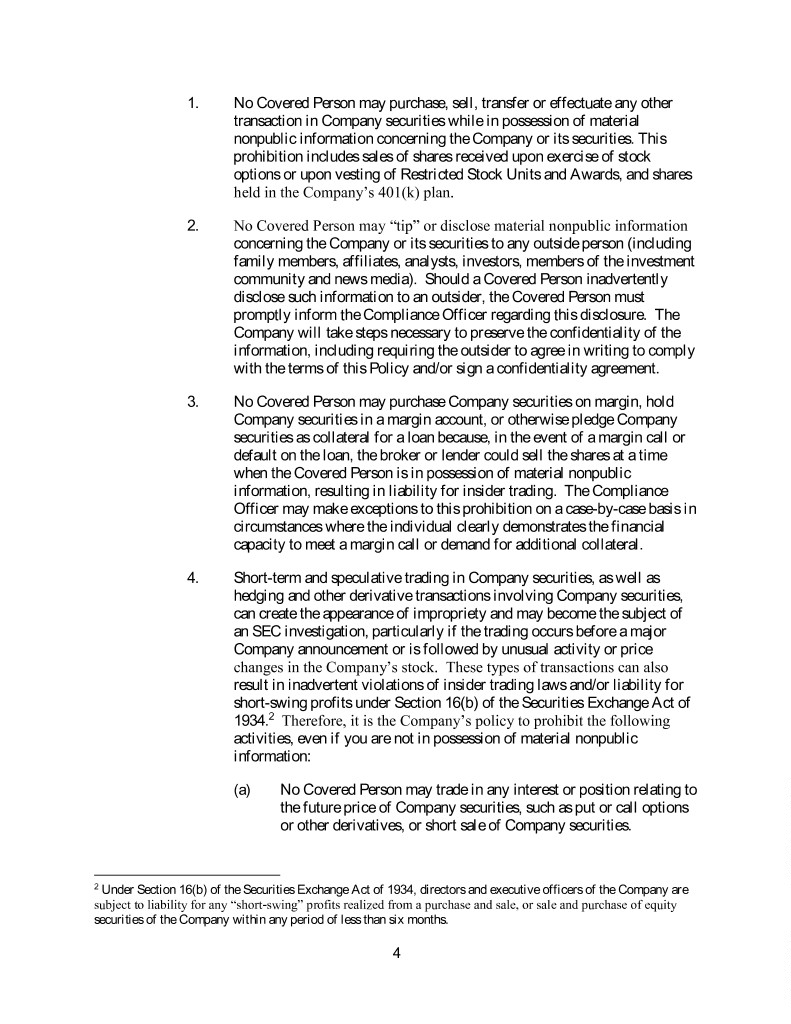
1. No Covered Person may purchase, sell, transfer or effectuate any other transaction in Company securities while in possession of material nonpublic information concerning the Company or its securities. This prohibition includes sales of shares received upon exercise of stock options or upon vesting of Restricted Stock Units and Awards, and shares held in the Company’s 401(k) plan. 2. No Covered Person may “tip” or disclose material nonpublic information concerning the Company or its securities to any outside person (including family members, affiliates, analysts, investors, members of the investment community and news media). Should a Covered Person inadvertently disclose such information to an outsider, the Covered Person must promptly inform the Compliance Officer regarding this disclosure. The Company will take steps necessary to preserve the confidentiality of the information, including requiring the outsider to agree in writing to comply with the terms of this Policy and/or sign a confidentiality agreement. 3. No Covered Person may purchase Company securities on margin, hold Company securities in a margin account, or otherwise pledge Company securities as collateral for a loan because, in the event of a margin call or default on the loan, the broker or lender could sell the shares at a time when the Covered Person is in possession of material nonpublic information, resulting in liability for insider trading. The Compliance Officer may make exceptions to this prohibition on a case-by-case basis in circumstances where the individual clearly demonstrates the financial capacity to meet a margin call or demand for additional collateral. 4. Short-term and speculative trading in Company securities, as well as hedging and other derivative transactions involving Company securities, can create the appearance of impropriety and may become the subject of an SEC investigation, particularly if the trading occurs before a major Company announcement or is followed by unusual activity or price changes in the Company’s stock. These types of transactions can also result in inadvertent violations of insider trading laws and/or liability for short-swing profits under Section 16(b) of the Securities Exchange Act of 1934.2 Therefore, it is the Company’s policy to prohibit the following activities, even if you are not in possession of material nonpublic information: (a) No Covered Person may trade in any interest or position relating to the future price of Company securities, such as put or call options or other derivatives, or short sale of Company securities. 2 Under Section 16(b) of the Securities Exchange Act of 1934, directors and executive officers of the Company are subject to liability for any “short-swing” profits realized from a purchase and sale, or sale and purchase of equity securities of the Company within any period of less than six months. 4
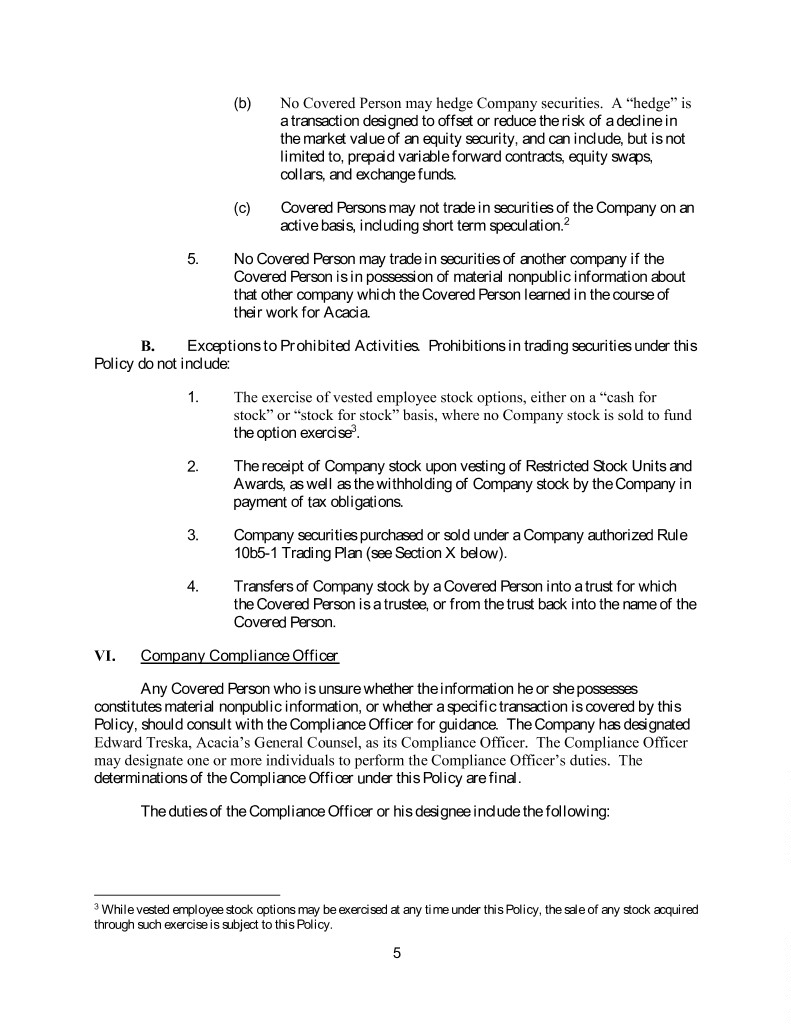
(b) No Covered Person may hedge Company securities. A “hedge” is a transaction designed to offset or reduce the risk of a decline in the market value of an equity security, and can include, but is not limited to, prepaid variable forward contracts, equity swaps, collars, and exchange funds. (c) Covered Persons may not trade in securities of the Company on an active basis, including short term speculation.2 5. No Covered Person may trade in securities of another company if the Covered Person is in possession of material nonpublic information about that other company which the Covered Person learned in the course of their work for Acacia. B. Exceptions to Prohibited Activities. Prohibitions in trading securities under this Policy do not include: 1. The exercise of vested employee stock options, either on a “cash for stock” or “stock for stock” basis, where no Company stock is sold to fund the option exercise3. 2. The receipt of Company stock upon vesting of Restricted Stock Units and Awards, as well as the withholding of Company stock by the Company in payment of tax obligations. 3. Company securities purchased or sold under a Company authorized Rule 10b5-1 Trading Plan (see Section X below). 4. Transfers of Company stock by a Covered Person into a trust for which the Covered Person is a trustee, or from the trust back into the name of the Covered Person. VI. Company Compliance Officer Any Covered Person who is unsure whether the information he or she possesses constitutes material nonpublic information, or whether a specific transaction is covered by this Policy, should consult with the Compliance Officer for guidance. The Company has designated Edward Treska, Acacia’s General Counsel, as its Compliance Officer. The Compliance Officer may designate one or more individuals to perform the Compliance Officer’s duties. The determinations of the Compliance Officer under this Policy are final. The duties of the Compliance Officer or his designee include the following: 3 While vested employee stock options may be exercised at any time under this Policy, the sale of any stock acquired through such exercise is subject to this Policy. 5

1. Administering this Policy and monitoring and enforcing compliance with all its provisions and procedures. 2. Responding to all inquiries relating to this Policy and its procedures. 3. Designating and announcing special trading blackout periods during which Restricted Persons may not trade in Company securities. 4. Annually providing copies of this Policy and other appropriate materials to all current Covered Persons. 5. Revising this Policy as necessary to reflect changes in federal or state insider trading laws and regulations. 6. In conjunction with the Company’s Human Resources Department, maintaining records of all documents required by the provisions of this Policy. VII. Confidentiality of Information Relating to the Company A. Access to Information. Risk of insider trading violations by individuals affiliated with the Company can be substantially limited by restricting the pool of individuals with access to material nonpublic information to the greatest extent possible. Access to material nonpublic information about the Company, including Acacia’s business, earnings and prospects, should be limited to officers, directors and employees of the Company on a need-to-know basis. In addition, such information should not be communicated to anyone outside of the Company, unless such person has signed an appropriate confidentiality agreement. When communication of material nonpublic information about the Company to employees becomes necessary, all directors, officers and employees must take care to emphasize the need for confidential treatment of such information and adherence to the Company’s policies with regard to confidential information. B. Disclosure of Information. Material nonpublic Company information is the property of Acacia and the confidentiality of this information must be strictly maintained within the Company. Only the Chief Executive Officer and the Chief Financial Officer are authorized to disclose material nonpublic information about the Company to the public, members of the investment community (including analysts) or to stockholders, unless one of these officers has expressly authorized disclosure by another employee in advance. All inquiries regarding the Company should be directed to the Chief Executive Officer or to the Chief Financial Officer and no other comment should be provided. VIII. Pre-Clearance Required for Trading by Covered Persons All Covered Persons must pre-clear planned transactions in Company securities as provided below: 1. The Covered Person proposing to effectuate a trade or other transaction in Company securities must notify the Compliance Officer in writing of the 6
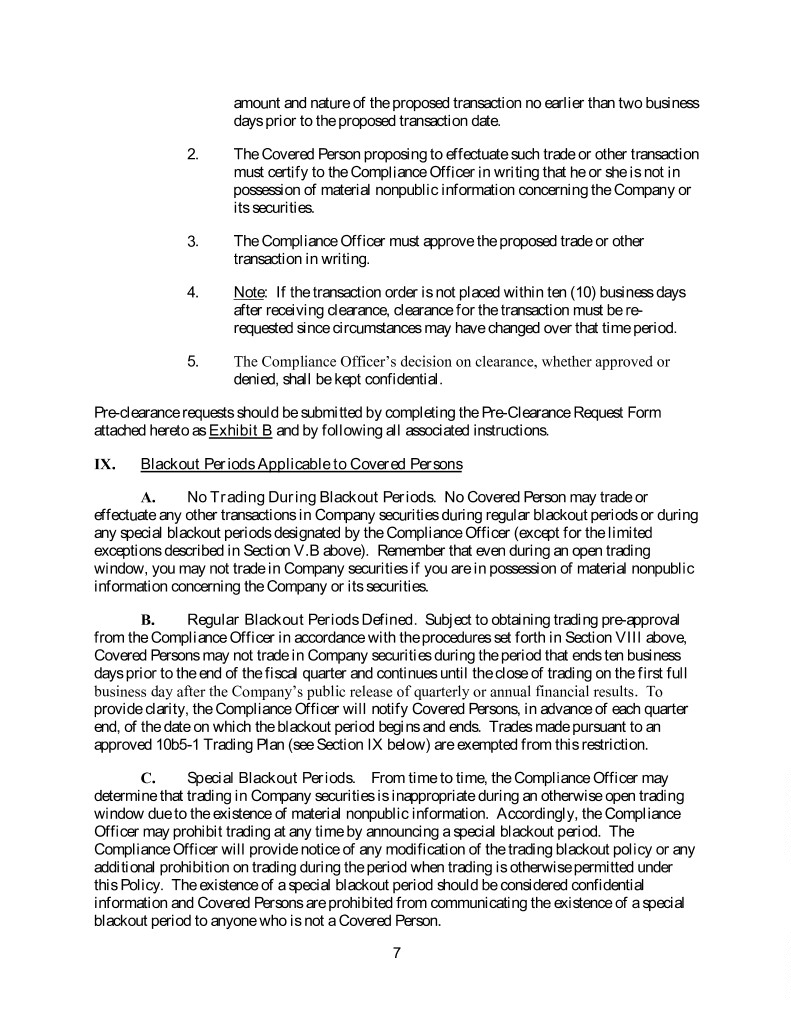
amount and nature of the proposed transaction no earlier than two business days prior to the proposed transaction date. 2. The Covered Person proposing to effectuate such trade or other transaction must certify to the Compliance Officer in writing that he or she is not in possession of material nonpublic information concerning the Company or its securities. 3. The Compliance Officer must approve the proposed trade or other transaction in writing. 4. Note: If the transaction order is not placed within ten (10) business days after receiving clearance, clearance for the transaction must be re- requested since circumstances may have changed over that time period. 5. The Compliance Officer’s decision on clearance, whether approved or denied, shall be kept confidential. Pre-clearance requests should be submitted by completing the Pre-Clearance Request Form attached hereto as Exhibit B and by following all associated instructions. IX. Blackout Periods Applicable to Covered Persons A. No Trading During Blackout Periods. No Covered Person may trade or effectuate any other transactions in Company securities during regular blackout periods or during any special blackout periods designated by the Compliance Officer (except for the limited exceptions described in Section V.B above). Remember that even during an open trading window, you may not trade in Company securities if you are in possession of material nonpublic information concerning the Company or its securities. B. Regular Blackout Periods Defined. Subject to obtaining trading pre-approval from the Compliance Officer in accordance with the procedures set forth in Section VIII above, Covered Persons may not trade in Company securities during the period that ends ten business days prior to the end of the fiscal quarter and continues until the close of trading on the first full business day after the Company’s public release of quarterly or annual financial results. To provide clarity, the Compliance Officer will notify Covered Persons, in advance of each quarter end, of the date on which the blackout period begins and ends. Trades made pursuant to an approved 10b5-1 Trading Plan (see Section IX below) are exempted from this restriction. C. Special Blackout Periods. From time to time, the Compliance Officer may determine that trading in Company securities is inappropriate during an otherwise open trading window due to the existence of material nonpublic information. Accordingly, the Compliance Officer may prohibit trading at any time by announcing a special blackout period. The Compliance Officer will provide notice of any modification of the trading blackout policy or any additional prohibition on trading during the period when trading is otherwise permitted under this Policy. The existence of a special blackout period should be considered confidential information and Covered Persons are prohibited from communicating the existence of a special blackout period to anyone who is not a Covered Person. 7
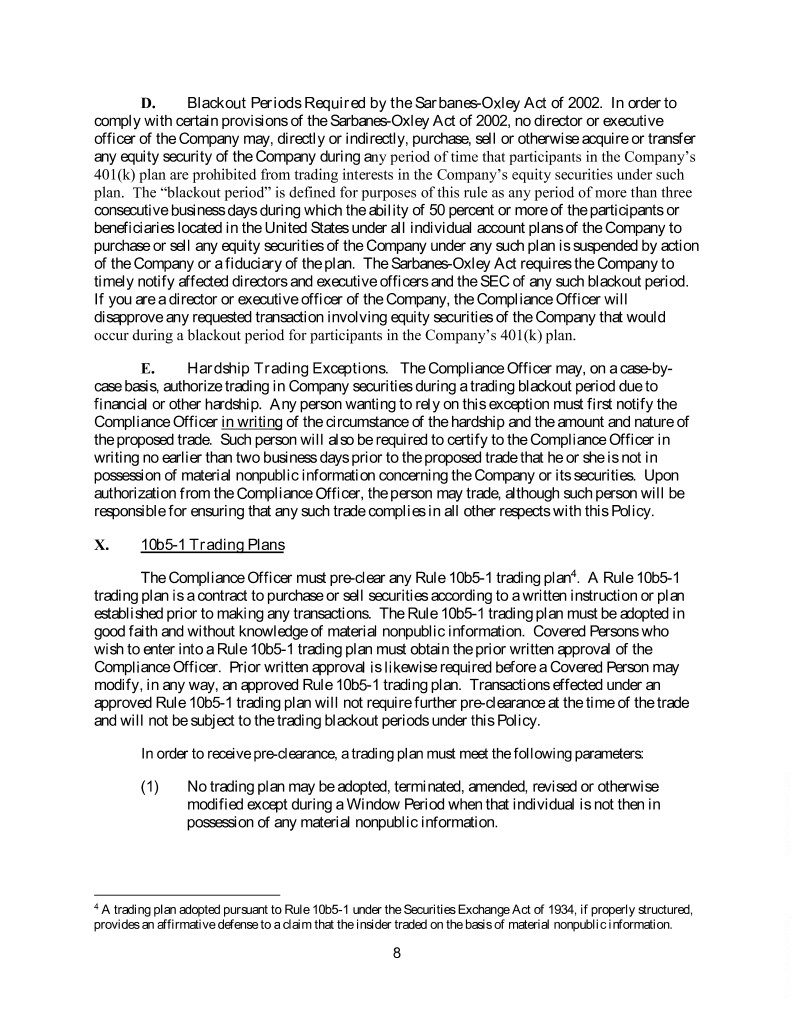
D. Blackout Periods Required by the Sarbanes-Oxley Act of 2002. In order to comply with certain provisions of the Sarbanes-Oxley Act of 2002, no director or executive officer of the Company may, directly or indirectly, purchase, sell or otherwise acquire or transfer any equity security of the Company during any period of time that participants in the Company’s 401(k) plan are prohibited from trading interests in the Company’s equity securities under such plan. The “blackout period” is defined for purposes of this rule as any period of more than three consecutive business days during which the ability of 50 percent or more of the participants or beneficiaries located in the United States under all individual account plans of the Company to purchase or sell any equity securities of the Company under any such plan is suspended by action of the Company or a fiduciary of the plan. The Sarbanes-Oxley Act requires the Company to timely notify affected directors and executive officers and the SEC of any such blackout period. If you are a director or executive officer of the Company, the Compliance Officer will disapprove any requested transaction involving equity securities of the Company that would occur during a blackout period for participants in the Company’s 401(k) plan. E. Hardship Trading Exceptions. The Compliance Officer may, on a case-by- case basis, authorize trading in Company securities during a trading blackout period due to financial or other hardship. Any person wanting to rely on this exception must first notify the Compliance Officer in writing of the circumstance of the hardship and the amount and nature of the proposed trade. Such person will also be required to certify to the Compliance Officer in writing no earlier than two business days prior to the proposed trade that he or she is not in possession of material nonpublic information concerning the Company or its securities. Upon authorization from the Compliance Officer, the person may trade, although such person will be responsible for ensuring that any such trade complies in all other respects with this Policy. X. 10b5-1 Trading Plans The Compliance Officer must pre-clear any Rule 10b5-1 trading plan4. A Rule 10b5-1 trading plan is a contract to purchase or sell securities according to a written instruction or plan established prior to making any transactions. The Rule 10b5-1 trading plan must be adopted in good faith and without knowledge of material nonpublic information. Covered Persons who wish to enter into a Rule 10b5-1 trading plan must obtain the prior written approval of the Compliance Officer. Prior written approval is likewise required before a Covered Person may modify, in any way, an approved Rule 10b5-1 trading plan. Transactions effected under an approved Rule 10b5-1 trading plan will not require further pre-clearance at the time of the trade and will not be subject to the trading blackout periods under this Policy. In order to receive pre-clearance, a trading plan must meet the following parameters: (1) No trading plan may be adopted, terminated, amended, revised or otherwise modified except during a Window Period when that individual is not then in possession of any material nonpublic information. 4 A trading plan adopted pursuant to Rule 10b5-1 under the Securities Exchange Act of 1934, if properly structured, provides an affirmative defense to a claim that the insider traded on the basis of material nonpublic information. 8
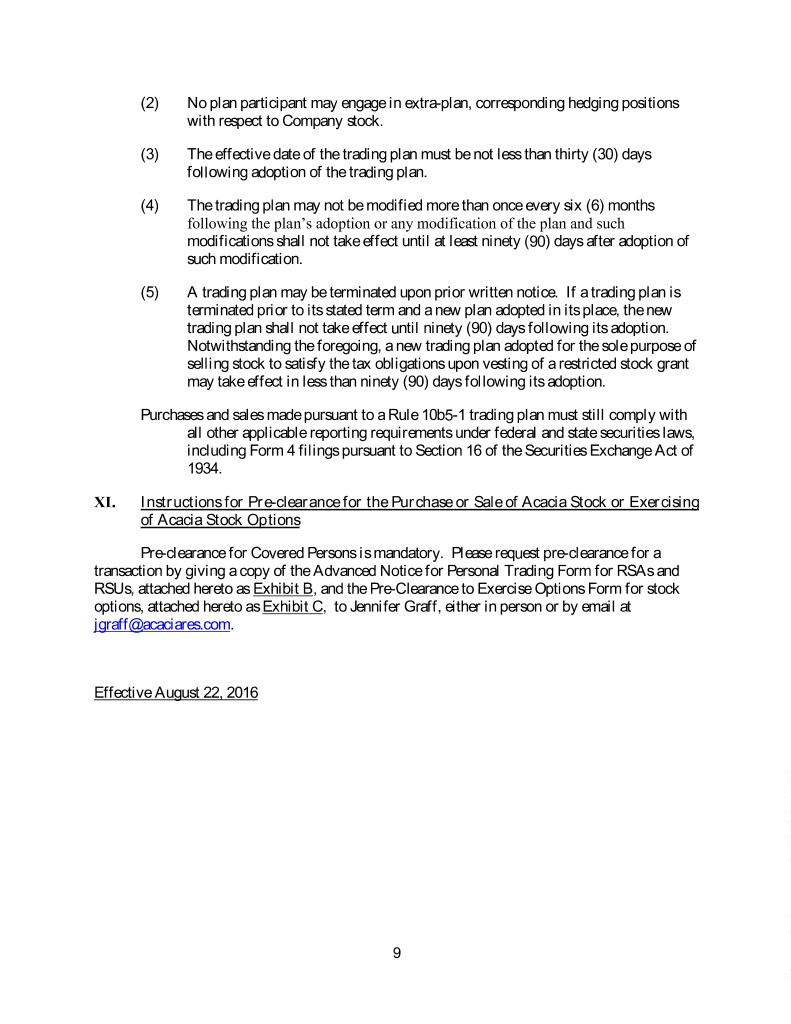
(2) No plan participant may engage in extra-plan, corresponding hedging positions with respect to Company stock. (3) The effective date of the trading plan must be not less than thirty (30) days following adoption of the trading plan. (4) The trading plan may not be modified more than once every six (6) months following the plan’s adoption or any modification of the plan and such modifications shall not take effect until at least ninety (90) days after adoption of such modification. (5) A trading plan may be terminated upon prior written notice. If a trading plan is terminated prior to its stated term and a new plan adopted in its place, the new trading plan shall not take effect until ninety (90) days following its adoption. Notwithstanding the foregoing, a new trading plan adopted for the sole purpose of selling stock to satisfy the tax obligations upon vesting of a restricted stock grant may take effect in less than ninety (90) days following its adoption. Purchases and sales made pursuant to a Rule 10b5-1 trading plan must still comply with all other applicable reporting requirements under federal and state securities laws, including Form 4 filings pursuant to Section 16 of the Securities Exchange Act of 1934. XI. Instructions for Pre-clearance for the Purchase or Sale of Acacia Stock or Exercising of Acacia Stock Options Pre-clearance for Covered Persons is mandatory. Please request pre-clearance for a transaction by giving a copy of the Advanced Notice for Personal Trading Form for RSAs and RSUs, attached hereto as Exhibit B, and the Pre-Clearance to Exercise Options Form for stock options, attached hereto as Exhibit C, to Jennifer Graff, either in person or by email at jgraff@acaciares.com. Effective August 22, 2016 9

EXHIBIT A CERTIFICATION I hereby certify that: I have read and understand the Company’s Insider Trading Policy Statement of Polices and Procedures Governing Material Nonpublic Information and the Prevention of Insider Trading. I understand that the Company’s Compliance Officer is available to answer any questions I have regarding this Insider Trading Policy. Since the effective date of the Insider Trading Policy, or such shorter period of time that I have been a director, officer, employee or contractor of the Company, I have complied with the Insider Trading Policy. I will continue to comply with the Company’s Insider Trading Policy for as long as I am a director, officer, employee or contractor of the Company. I understand that failure to comply with the Insider Trading Policy could subject me to disciplinary action or termination of the business or employment relationship with Acacia. Signature Date Printed Name (Please print legibly) Exhibit A
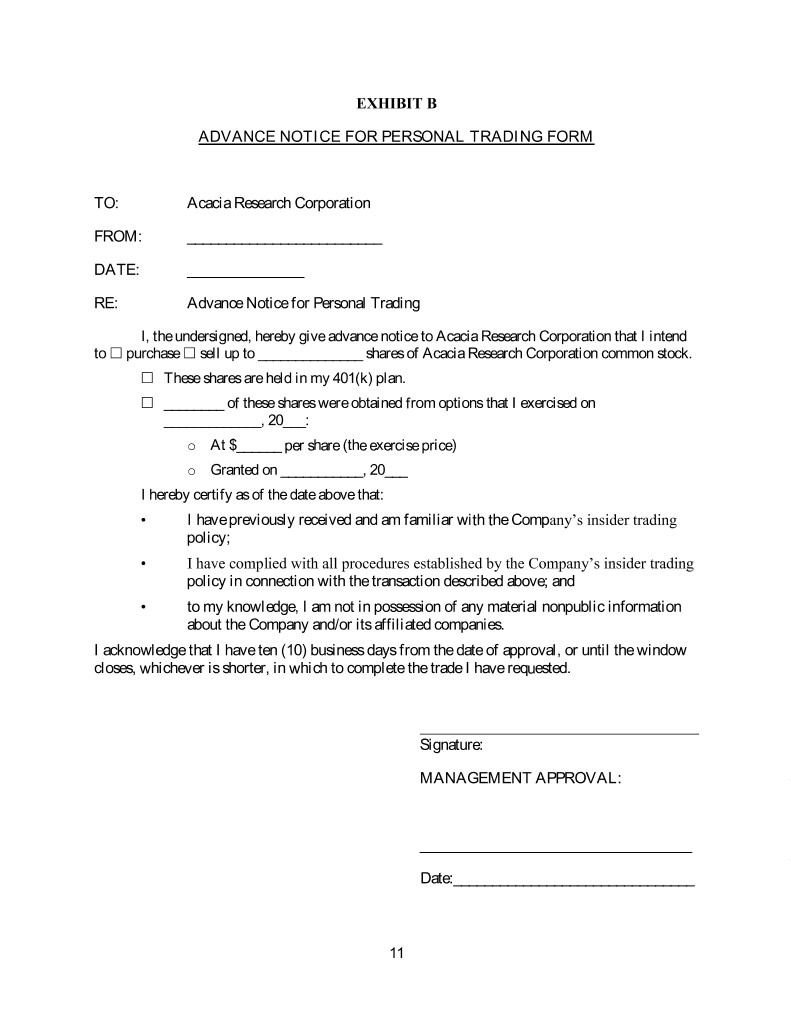
EXHIBIT B ADVANCE NOTICE FOR PERSONAL TRADING FORM TO: Acacia Research Corporation FROM: _________________________ DATE: _______________ RE: Advance Notice for Personal Trading I, the undersigned, hereby give advance notice to Acacia Research Corporation that I intend to purchase sell up to ______________ shares of Acacia Research Corporation common stock. These shares are held in my 401(k) plan. ________ of these shares were obtained from options that I exercised on _____________, 20___: o At $______ per share (the exercise price) o Granted on ___________, 20___ I hereby certify as of the date above that: • I have previously received and am familiar with the Company’s insider trading policy; • I have complied with all procedures established by the Company’s insider trading policy in connection with the transaction described above; and • to my knowledge, I am not in possession of any material nonpublic information about the Company and/or its affiliated companies. I acknowledge that I have ten (10) business days from the date of approval, or until the window closes, whichever is shorter, in which to complete the trade I have requested. Signature: MANAGEMENT APPROVAL: ___________________________________ Date:_______________________________ 11

EXHIBIT C PRE-CLEARANCE TO EXERCISE OPTIONS I,_______________________, hereby notify Acacia Research Corporation (the “Corporation”) that I elect to purchase ____________ shares (the “Exercised Shares”) of the Corporation’s Common Stock (“Common Stock”) at the option exercise price of ________per share (the “Exercise Price”) pursuant to that certain option granted to me under the Acacia Research Corporation 20__Stock Incentive Plan on ____________, 20__(the “Option”). Type of Option _______ Incentive Option (ISO) _______Non-Statutory Option (Non-Qual) Type of Transaction ____ Cash Exercise (Purchase of the option shares with the intent to hold the shares for sale at a future date). NOTE: If you choose to do a cash exercise, you may not sell the acquired share without subsequent approval during a period when the trading window is open. Please refer to the Acacia Insider Trading Policy. ____ Cashless Exercise (Same-day purchase of the option shares and immediate sale of all the shares on the open market.) ____ Sell-to-Cover Exercise (Purchase of the option shares and immediate sale of less than all the shares). NOTE: If you choose to do a Sell-to-Cover exercise, you may not sell the remaining shares without subsequent approval during a period when the trading window is open. Please refer to the Acacia Insider Trading policy. Concurrently with the delivery of this Notice of Exercise to the Corporation, I shall pay, or cause to be paid to the Corporation the Exercise Price for the Exercised Shares in accordance with the provisions of my agreement with the Corporation (or other documents) evidencing the Option and shall deliver whatever additional documents may be required by such agreement as a condition for exercise. I hereby certify as of the date above that: I have previously received and am familiar with the Corporation’s Insider Trading Policy; I have complied with all procedures established by the Corporation’s Insider Trading Policy in connection with the transaction described above; and To my knowledge, I am not in possession of any material nonpublic information about the Corporation and/or its affiliated companies. I acknowledge that I have ten (10) business days from the date of approval, or until the window closes, whichever is shorter, in which to complete the trade I have requested. I also acknowledge that I will notify Jennifer Graff by email as soon as I have given my broker any exercise instructions. _______________________ __________________________________ Date Signature APPROVED: _________________________________ Date: ________________ Exhibit C
